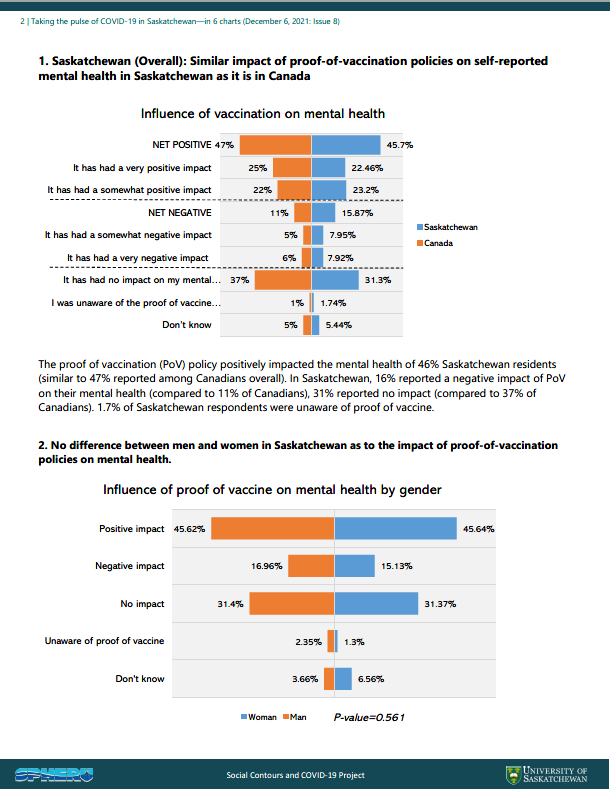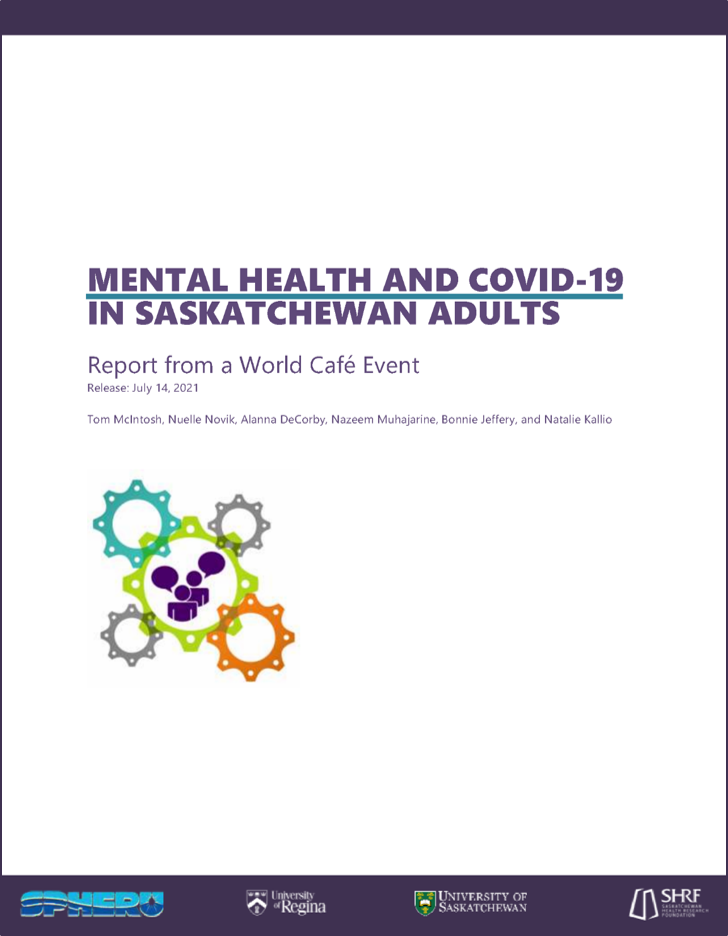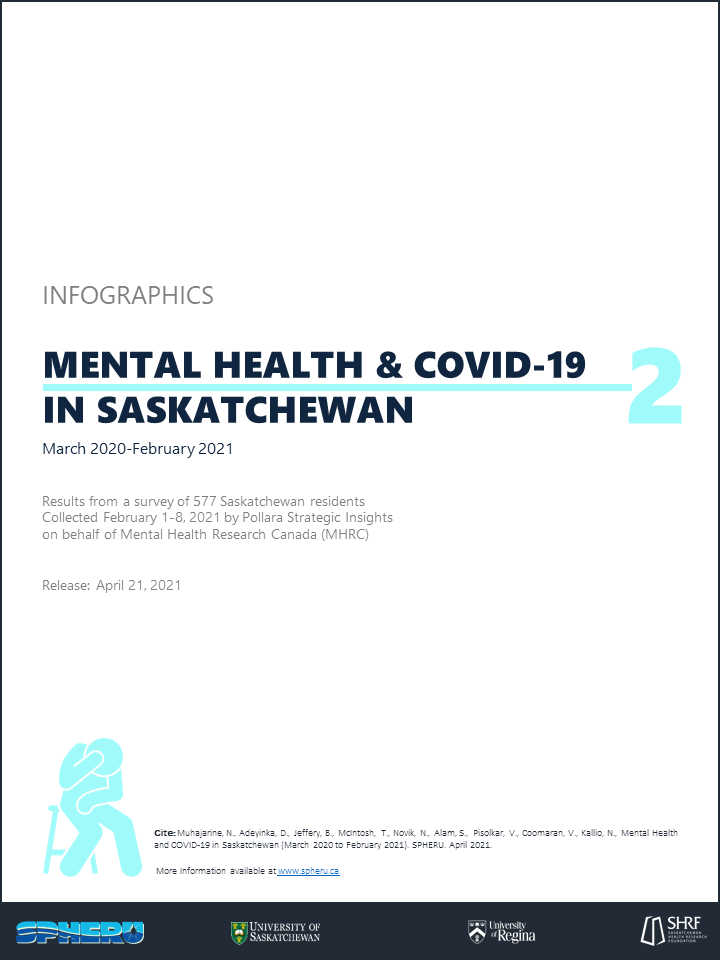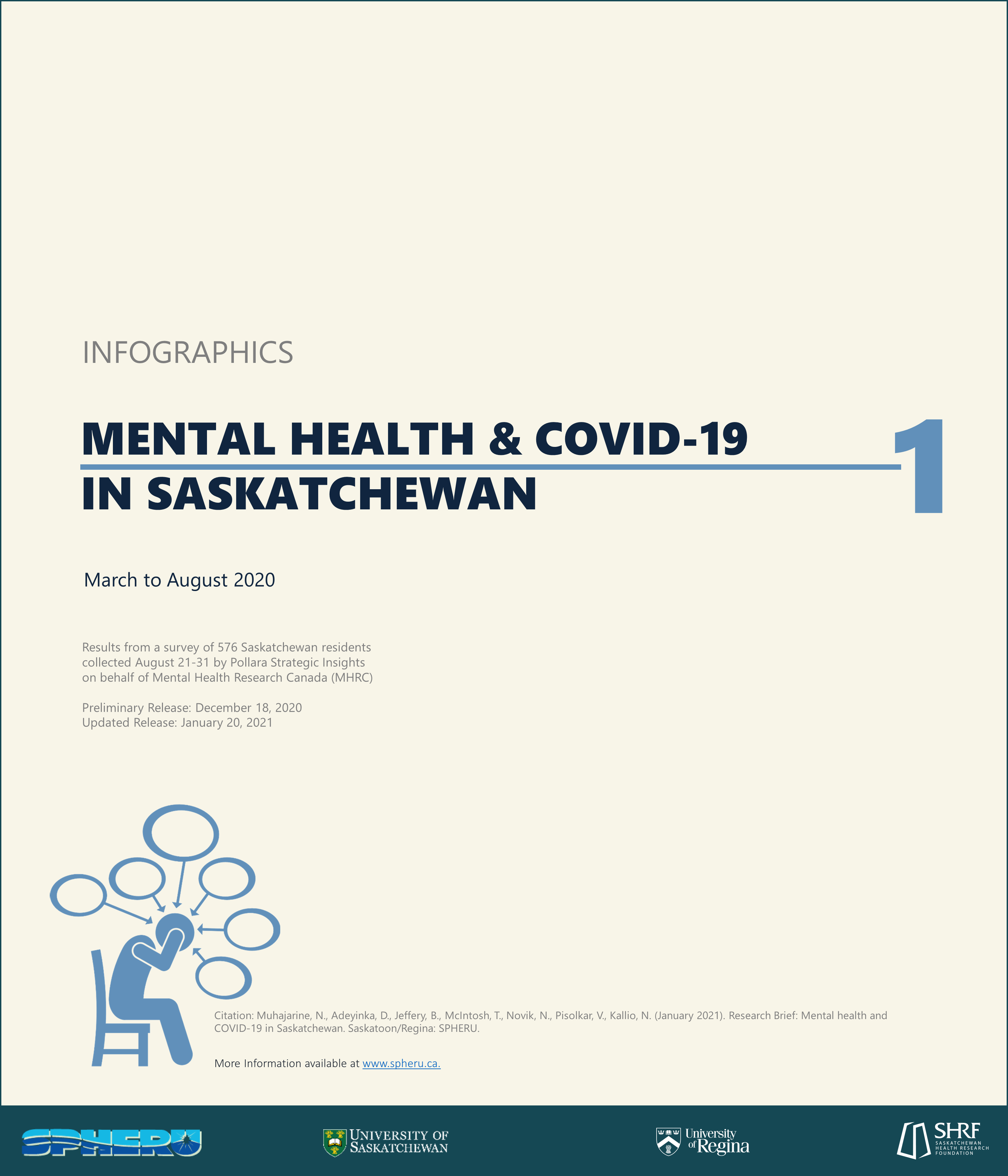Results and Analysis
Taking the Pulse of COVID-19 in Saskatchewan
Issue 11: Taking the Pulse of COVID-19 in Saskatchewan - in 6 charts
Released November 4, 2022
QUESTIONS: What is the prevalence of negative mental health outcomes in Saskatchewan adults during the first 16-months of the pandemic? How did visible minorities, immigrants, people with lower socioeconomic status fare? What were the policy implications?
Key Takeaways
- A High proportion of Saskatchewan adults reported anxiety and depressive symptoms. About 60% of respondents reported any form of anxiety and about 45% reported any form of depression during the study timeline, August 2020 to June 2021.
- During the Alpha-driven pandemic wave (February 2021) prevalence of severe anxiety (26%) and severe depression (19%) were highest.
- Of the three cycles of data, in August 2020, February 2021, June 2021, the highest percentage of respondents reporting needing--but not accessing--mental health support was in June 2021 at 12%.
- Younger, women, respondents in households with low income, immigrants with lower education were associated with negative mental health. In contrast, those who were retired/were post-secondary students were less likely to report negative mental health outcomes
- Intersectoral collaboration to improve mental health service access and delivery must include a shift of focus to patient/client; flexibility and innovation are key elements of service redesign or reform to ensure the right services are provided at the right time.
Issue 10: Taking the Pulse of COVID-19 in Saskatchewan—in 13 charts
Released June 23, 2022
QUESTION: What is the mental health status of Saskatchewan adults after two years of the COVID-19 pandemic?
Key Takeaways
- Prevalence of moderate and severe depression was 33% and 15% respectively, and prevalence of moderate and severe anxiety was 40% and 21% respectively, which were comparable to the prevalence rates from the previous cycle (cycle 9, November 2021). In November 2021, the prevalence of moderate and severe depression was 30% and 16%, respectively. The prevalence of moderate and severe anxiety was 38% and 22%, respectively.
- Prevalence of moderate depression and anxiety was higher among employed people; however, severe depression and anxiety was higher among unemployed participants.
- Participants aged 16 to 29 years old, compared to those 50 years or older, were most likely to declare they experienced either moderate or severe depression. Those who were retired or were students were less likely to declare that they experienced moderate or severe depression.
- Participants who identified as women, compared to men, were more likely to indicate they experienced either moderate or severe anxiety. As with depression, those who were retired or were students were less likely to declare either moderate or severe anxiety.
Issue 8: Taking the Pulse of COVID-19 in Saskatchewan—in 6 charts
Released December 6, 2021
QUESTION: What is the impact of vaccination policies on self-reported mental health of adults in Saskatchewan?
Key Takeaways
- Overall, in Saskatchewan adults, the proof-of-vaccination policy has had a positive effect on self-reported mental health of most adults, approximately one in two; however, one in six respondents stated the policy had negative effects on their mental health.
- The impact of proof of vaccine policy on self-reported mental health in Saskatchewan is comparable to the rest of Canada.
- The effect of the policy is does not vary significantly by gender, among equity-seeking groups, and by location of residence.
- Respondents who have been mostly negatively impacted by proof of vaccine policy were younger adults (<55 years), about one in five, and those who declared themselves as unvaccinated.
See more issues of Taking the Pulse of COVID-19 in Saskatchewan (results and analysis from the Social Contours and COVID-19 research team).
Report from a World Cafe Event
Report from a World Café Event
On May 26 and 27, 2021, SPHERU researchers onvened a gathering of approximately 30 individuals from the mental health sector to discuss the impact of the COVID-19 pandemic on the mental health of Saskatchewan adults and begin to chart a research-informed course forward for post-pandemic mental health services in the province.
- Report from a World Café Event: Mental Health and COVID-19 in Saskatchewan Adults - Release: July 14, 2021
Survey Results
Wave 2 Results (Survey: February 1-8, 2021)
- RESEARCH BRIEF: Mental Health and COVID-19 in Saskatchewan 2 (March 2020 to February 2021) - Release: May 13, 2021
- INFOGRAPHICS: Mental Health and COVID-19 in Saskatchewan 2 (March 2020 to February 2021) - Release: April 21, 2021
How the survey was conducted
This is the second Saskatchewan data sample as part of the fifth of a series of national surveys of Canadians on mental health during COVID-19 sponsored by Mental Health Research Canada (MHRC). Pollara Strategic Insights, a polling firm, conducted the online survey among a sample of 3,005 adult Canadians. Saskatchewan Health Research Foundation (SHRF) partnered with MHRC to sponsor an enhanced sample from Saskatchewan of 577 adults (18-years and older) for stand-alone provincial analysis. The survey in Saskatchewan was conducted February 1-8, 2021. The results have been weighted by the most current census data in terms of gender, age and region to ensure the total sample is representative of the population (as of 2016) as a whole. The margin of error of our estimates are ±4.07%. This means, if this was a random sample, the percentage estimates reported will fall within 4.07% of the true value (4.7% higher or lower), 19 out of 20 times.
Wave 1 Results (Survey: August 21-31, 2020)
Preliminary Release: December 18, 2020
Updated Release: January 20, 2021
Available for Download:
- RESEARCH BRIEF: Mental Health and COVID-19 in Saskatchewan (PDF)
-
INFOGRAPHICS: Mental Health in Saskatchewan in the first 6 months of COVID-19 (PDF)
